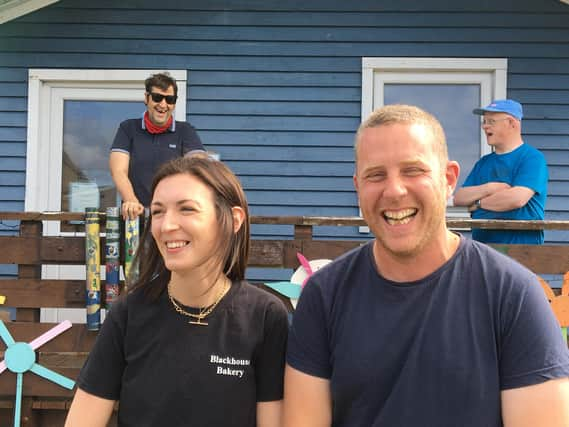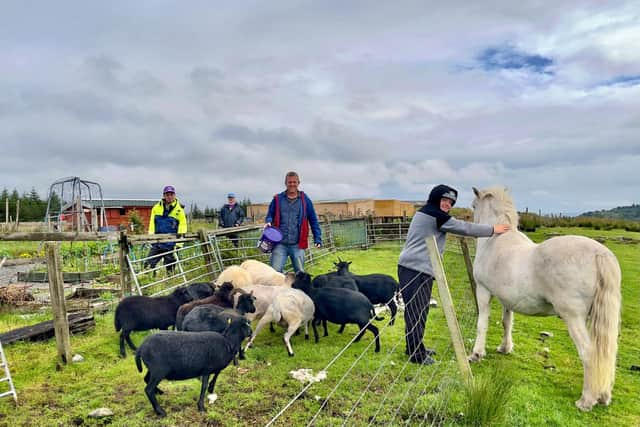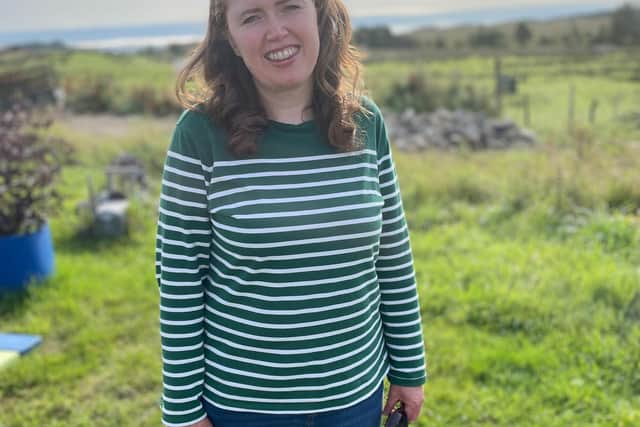How a farm on Lewis became a special place


Every parent who has sons or daughters with special needs shares a common ambition that, in adulthood, there will be a role that provides motivation, stimulation, enjoyment – no more or less than for the rest of us. Macaulay College Community Interest Company, or Macaulay Farm for short, does all of that and more.
Its existence is possible because of the fortuitous fact that, since the 1960s, the Engebretsen family has owned land, near Stornoway, that was once an experimental farm attached to the Macaulay Soil Research Institute in Aberdeen, with its own interesting story.
Advertisement
Hide AdAdvertisement
Hide AdThat land was always a factor in the mind of Roland Engebretsen who recalls: “I joined the Scouts when I was 10 . There were several boys in the troop who had additional support needs and every Saturday we would go out to beaches, or the Castle grounds and generally have a great time.


“Alec, who has Down’s Syndrome, was one of the most fun people I’d met. We all loved him and he and I became lifelong friends. Because we had a great Scout leader, Don Laing, we were brought up understanding the importance of including everyone to the best of their abilities. Looking back, I see it was all about the enjoyment of our friends being included rather than any sort of charitable impulse, which I think is how some onlookers saw it.
“Through this, I developed an interest in working with people with additional support needs and got involved helping in what was known as the special class in the Nicolson Institute. When people moved from there into day centre or day support at home models, I saw many being under- stimulated and their potential underestimated.”
Roland then studied fine art for five years with the intention of becoming an art therapist, but remained drawn to a role in which he would have regular contact with the people he worked with.
Advertisement
Hide AdAdvertisement
Hide Ad“As a teenager, I started to formulate a rough idea of using my grandfather’s farm to provide a type of support more similar to what I’d experienced in the Scouts. During art school I discovered Camphill communities, which seemed to be almost exactly what I envisaged so I took a year out as a full-time volunteer.”


He returned to the Camphill community in Carmarthenshire after graduating.
“That was a very intense form of support work which involved volunteers living in houses with the people they supported, maybe 10 to a house. The students went to workplaces through the day and had social activities at night.
“The model allowed people with very high support needs to live rounded lives where they had responsibilities, opportunities to achieve and develop, and rich social lives. In general, after a few months or even weeks, people exhibited less challenging behaviour and required less medication for behavioural or mental health issues.”
Advertisement
Hide AdAdvertisement
Hide AdRoland was not ready to settle into a permanent job in a remote Welsh location and moved back to Scotland where he became a relief worker, through an agency, in a range of services.
“This gave me experience of mental health, drugs and alcohol, dementia in a way I wouldn’t otherwise have encountered. However, both staff and service users were generally bored so behavioural issues and high medication prevailed. My experience in Wales was that physical outdoor activities and work reduced these things dramatically.”
Roland also delivered art workshops to people with special needs and to primary children.
When he inherited a share of Macaulay Farm, he and Becca Lindsay – whom he had met at art school and shared the same interests - decided to give the long-nurtured idea a go.
Advertisement
Hide AdAdvertisement
Hide Ad“We moved up in October, 2009, and bought a free range egg business that was already on the farm. With 400 hens, and day jobs to tide us over, we were able to fund the start-up of Macaulay College.
“In June 2010, we got our first client, Ethan Mitchell, who came out a day a week initially. My old friend Alec soon joined him and we were able to secure Health Board funding to put up a small building. The firm which quoted for erecting the building pulled out. So our main activities for the first year were looking after hens and building it ourselves.
“We worked alongside a patient joiner who let us get fully involved in every aspect of the build, which allowed us to stretch our funding and complete the building. The main benefit was that the growing number of people coming out to take part in activities all got to be a part of building their premises.
“We have endeavoured to include all new students in constructing permanent features so they can have a sense of ownership. When people come for a workshop through Action for Children or schools, we have them make something which remains here as a permanent decoration or part of a shed so, when they are older, they still have that link and feeling of it already being their place.”
Advertisement
Hide AdAdvertisement
Hide AdTo avoid being pigeon-holed, Roland and Becca chose the name Macaulay College.
“We started by offering Caledonian Awards but quickly found the people attending were getting more benefit from setting their own activities and developing these organically. When Caledonian Awards ceased we didn’t look for a replacement.
“The majority attending would be unlikely to move into unsupported employment so official awards and low level qualifications are less useful to them than genuinely fulfilling activities and challenges. Our main focus remains on improving feelings of wellbeing, self-confidence and self-worth.
“Even for those who attend as a supplement to their mainstream education we have found that focusing on these outcomes is hugely beneficial for them. I’ve been very proud to see teenagers come to us as part of their school week and then eventually end up working for us or in similar roles elsewhere.
Advertisement
Hide AdAdvertisement
Hide Ad“When Becca and I were developing the idea for Macaulay College it was important to increase the range of provision rather than duplicate what existed. A lot of adults with learning disabilities spent most of their time at home and the majority of what was offered was based indoors. The activities we offer have always been steered by the interests of the people attending.
“We increased the variety of animals slowly over the years. often re-homing them through the SSPCA or private requests. We have had a variety of breeds of sheep and pigs, retired milking goats, donkeys, and Eriskay ponies, turkeys, ducks, quail, pheasants, rabbits, guinea pigs, stick insects, fish, turtles, a chinchilla and a snake which was living wild in the Cearns!”
Activities undertaken include woodwork, metal work, candle making, building, baking, cooking, drawing , painting, pyrography, ceramics, fencing, gardening, playing music, attending gigs, setting up and helping at events, litter picking, tree planting – you name it!
The college’s main source of funding has been through charging for individual places. This started off being through Direct Payments, which are now controlled by individuals receiving the service or their carers. Then the local authority started to buy places directly on a month by month basis.
Advertisement
Hide AdAdvertisement
Hide AdRoland said: “When the pandemic hit and we went into lockdown the majority of our clients took the advice and stayed at home. Only a few continued attending, as the benefits to maintaining their routine outweighed the risks. With that, almost all of our income disappeared over night.
“Between the furlough scheme and charitable support we were able to hold on until sufficient numbers were safe to return. We were extremely fortunate to receive funding from the Charities Aid Foundation and later the Lottery to build two wooden barns big enough to social distance and also suitable for bringing animals into over winter.
“The next stage is to get electricity to that point on the farm so we can have light and heat through the winter. The first barn was bought as a flat pack, but the second was built completely from scratch by the people attending.
“Over lockdown we also planted an area of forest which will provide a sheltered woodland walk ending in a clearing with a sensory garden.”
Advertisement
Hide AdAdvertisement
Hide AdThe next big plan is to extend the original building significantly to offer more places and better facilities. Improved wheelchair access and resurfacing of farm tracks are also on the agenda and all of this is forcing a rethink about funding.
Roland said: “These are all big costly jobs that aren’t easy for a small non-profit organisation to undertake. I have always been reluctant to fundraise through sponsored activities or ask for donations. We preferred that our client group make things to sell and generate our own income.
“However, we have had a lot of people asking if they can donate to us and given the scope of our plans and the costs involved I have softened to the idea of accepting their generosity!”
That approach will soon be formalised into a Crowdfunding exercise.
Advertisement
Hide AdAdvertisement
Hide AdIn addition to Roland and Becca, who remains fully involved, there are 14 employees at the college. Recruitment has mainly been by word-of-mouth and has not proved difficult. One long-standing employee, Jo-Ann McConnochie, has just taken on the Development Officer role to take forward expansion plans.
Covid prevented a 10th birthday celebration and the 12th is the next target landmark. Whenever it is, there will be many appreciative people offering their good wishes towards a remarkable place and the people who have made it what it is – utterly indispensable and a shining example.